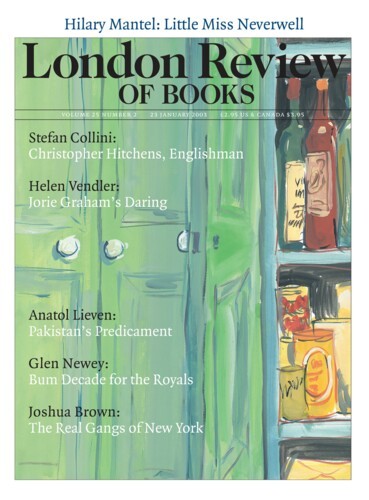There’s a pretty steady effluence these days of works of sub-Darwinian evolutionary psychology, books that propound a startling, and often startlingly simple new theory to explain, and perhaps to explain away, every and any aspect of human nature. A recent example is The Eternal Child: An Explosive New Theory of Human Origins and Behaviour by Clive Bromhall (Ebury, £17.99). Bromhall was planning to write a book ‘about the evolution of human homosexuality’, he tells us, having made it clear he’s married with children, but it turned into a book about the evolution of human everything. ‘From breasts to religion, and big brains to standing upright, there is a single thread that links all human biology together’: we’re apes who never grow up. The evidence for this is all the things we apparently share with infant chimpanzees, such as a common ancestor a very long time ago, not much body hair, a relatively large head, and kissing. God’s simply the parent we never grow out of the need for: if only Kierkegaard had known.
Bromhall’s explosive theory could probably be found to apply to the Granta Best of Young British Novelists list, which was announced earlier this month, to muted fanfare. Interestingly, the people who were least enthusiastic about the list appeared to be the people who’d compiled it. The Today programme tried to get a dispute going between Philip Hensher (37), one of the chosen writers, and Ian Jack (57), the editor of Granta and chair of the judges, after Hensher said he thought it was silly and arbitrary that novelists had to be under 40 to be considered, and that it should be more important that they’re new than that they’re young. Jack agreed. Few I suspect would go as far as John Sutherland (64) – the irrepressible champion of Salman Rushdie (55), whose most recent novel, Fury, wasn’t otherwise very well received – who has said he thinks novels shouldn’t be written by people under 50. Despite all of which, the most media attention in the aftermath of the Granta announcement has been lavished on Adam Thirlwell (24), whose first novel is yet to be published, but who, more importantly, is the only one on the list apart from Zadie Smith (27) under 30.
None of them is younger than 20, which shouldn’t be very surprising. The only teenage candidate I can think of is Anna Stothard (19): Isabel and Rocco, which she wrote when she was 17, will be out in April (Arrow, £6.99). If you bear in mind the age of the author, it’s not at all badly done. If you bear in mind the age of the author. But – as I suspect Stothard, who starts her undergraduate degree at Oxford in the autumn, will within a year or two be the first to admit – it isn’t really good enough to be published. And it would no doubt have been politely rejected were Stothard not, in the words of her publicist, ‘a hugely promotable young writer’. When she was 16 she had a column in the Observer called ‘Teenage Kicks’, and spent a month working for Tina Brown’s Talk. She has ‘great media contacts’: her mother is the novelist Sally Emerson; her father is Sir Peter Stothard, the freshly knighted editor of the TLS and former editor of the Times. So who cares about the text? The whole circus could be seen as a pale attempt to follow the transatlantic precedent set by Nick McDonell, the teenage author of Twelve (Atlantic, £9.99, reviewed in the LRB of 5 September 2002), whose godfather, Morgan Entrekin, is the owner of Atlantic books.
Nepotism has been around for as long as there have been nephews (or sons), though the word dates from the mid-16th century, when it was used with particular reference to the preferment of nephews, or ‘nephews’, of Popes, who for obvious reasons didn’t have sons, at least not officially (it’s worth remembering that Cesare and Lucrezia Borgia were the children of Pope Alexander VI). By way of an example: Arthur Balfour was made Chief Secretary of Ireland when his mother’s brother, the Marquess of Salisbury, or ‘Robert’ to his friends, was Prime Minister – hence ‘Bob’s your uncle.’ Here’s a curiosity: Allan H. Meltzer, whose most recent book is A History of the Federal Reserve, Vol. I: 1913-51 (Chicago, £52.50), is the Allan H. Meltzer University Professor of Political Economy at Carnegie Mellon University. What are the chances?
Send Letters To:
The Editor
London Review of Books,
28 Little Russell Street
London, WC1A 2HN
letters@lrb.co.uk
Please include name, address, and a telephone number.

